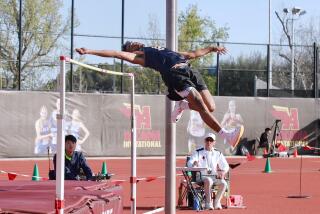Willie Banks Knows All About Goodwill
- Share via
It’s the kind of simplistic, idealistic goal that sounds so good--better understanding between nations through sports. It’s what the Olympics sell every four years and what Ted Turner’s Goodwill Games hope to produce this summer in Moscow. It’s something triple jumper Willie Banks has seen happen.
Banks, the world record-holder at 58 feet, 11 1/2 inches, was at Mexico City in 1979, competing at the World University Games when a questionable drag foul was called on him. “I was mad, because I knew I hadn’t fouled,” he said. “Then they called one on the Russian, too.”
Gennady Valyukevic had not fouled either, at least not as far as Banks was concerned, and the American protested again. “He was one of the best. I wanted to go against him. I didn’t want him disqualified. I complained for him, but it didn’t work.”
Two years later, at a US-USSR joint meet in Leningrad, Banks and Valuyukevic met again. “I went in thinking I’d go 57 feet on every jump and I’d win,” Banks said. “But I wasn’t jumping that well. Then I got one at 56 feet. On Valyukevic’s next jump, he wasn’t close but they announced longer numbers for him.”
It was a classic case of hometown judging, perhaps a little bit of getting even for what had happened to the Soviet at Mexico City. Banks would not sit still for it. “I started arguing with the judge. He pushed me away and I pushed him back. It was getting pretty hot.”
This doesn’t exactly sound like an experiment in international understanding. Then Banks felt a hand on his shoulder. It was Valyukevic.
“He said to me, ‘You know and I know what is going on here. Our job is to compete and enjoy the competition. I respect you and you respect me. We have rapport with each other. We are friends.’ ”
Friends.
Banks liked the sound of that.
“It was an example of what competition can do to people,” he said. “Even in a tense situation, competition can relax you and make it more palatable.”
Relaxation has never been a major problem for Banks, whose unique style pulled the triple jump out of track and field’s shadows into the sport’s mainstream.
Once staged in relative privacy, the event has evolved into a happening, especially when Banks is out there leading the crowd’s cheers. Call them participating patrons, clapping along with him as he prepares to take off on his approach.
That started in Stockholm in 1981 when Banks became outraged at a track and field promoter who had canceled the triple jump in his meets, calling the event boring. It meant cutting short Banks’ European season and so he set out to prove the man wrong.
“I swore up and down that I’d do something at that meet, maybe a world record, to change his mind. I was hot. I ran to the stadium, full of energy. Two hours ahead of time, I was out there warming up, stretching.”
Banks was wearing his Walkman, listening to a guitar instrumental by Parliament-Funkadelic. “You know, I was getting plastered on this one song, ‘Not Just (Kneejerk).’ I was into a groove, letting myself go, my head bobbing, waving to the crowd, blowing kisses.”
More to Read
Go beyond the scoreboard
Get the latest on L.A.'s teams in the daily Sports Report newsletter.
You may occasionally receive promotional content from the Los Angeles Times.





